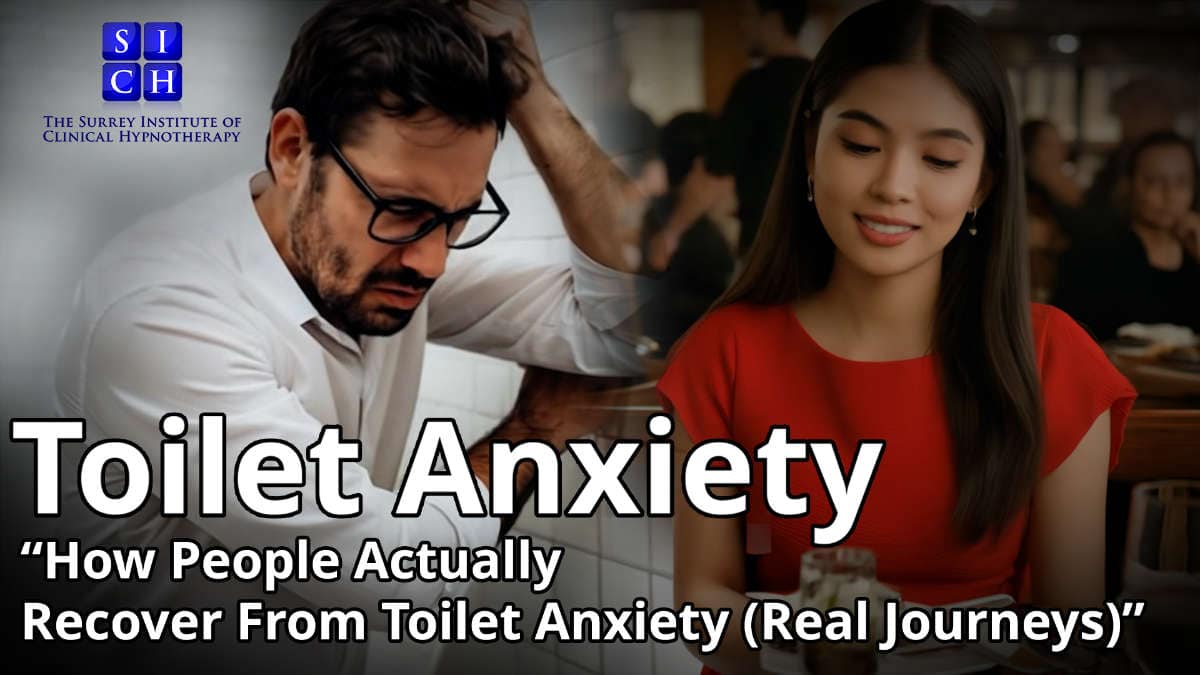When you are living with toilet anxiety, almost every decision starts to bend around one question, where is the nearest toilet if I need it. Journeys, meetings, meals out, even short walks close to home can begin to feel like risks. It is no surprise that you end up searching for a way out, and wondering whether anyone really does get past this.
In the video above I share two real client case studies and what changed for them. Here, we will slow things down a little and look more closely at what recovery looks like in real life, not a perfect life where toilets never cross your mind, but a steady return to normal choices.
If you want the full guide to the approach behind these case studies, the page How To Overcome Toilet Anxiety explains the pattern in depth and what to do next.
On this page
See The Entire Toilet Anxiety Recovery Series
If you prefer to watch rather than read, you can also find all the videos in this 13 part series on toilet anxiety, (that have already been released) here.
If you are starting from the beginning, you may also find it helpful to read the first article in this series, Toilet anxiety, why most advice fails, and what actually works.
It explains why common coping tips so often backfire and introduces the false alarm loop that sits underneath toilet anxiety, which matters because it changes what recovery even means. When people search for What Recovery Looks Like For Toilet Anxiety, they often imagine a life where they never think about toilets again. Real recovery is usually quieter than that. It is getting your choices back, without needing to negotiate with your body all day.
The difficult truth is that most of what you find online about how to recover from toilet anxiety is either too simplistic or aimed at the wrong target. You might be told to use distraction, always sit on the end of a row, map every toilet in advance or drink less before you leave the house. On paper these ideas sound practical. In real life, they keep your brain convinced that you are in danger and quietly reinforce the very pattern you are trying to change.
Before we talk about recovery in a meaningful way, it helps to understand why it feels so powerful in the first place.
How toilet anxiety takes over
Toilet anxiety is not a character flaw and it is not you being weak. It is a survival system that has learned the wrong lesson. At some point your brain linked the idea of not having instant access to a toilet with serious threat and your body started to react as if something terrible was about to happen. The rush of urgency, the churning stomach, the tightness or fluttering, all of that is your nervous system doing what it does in any perceived emergency.
The problem is that with toilet anxiety, there is usually no actual emergency. Yet the body reaction is so strong that your mind believes it. You start to scan your body more closely, you rush to the toilet just in case, you arrange your life around routes and exits. Each time you do, your survival system takes it as proof that the threat must be real.
So when you ask yourself how to recover from toilet anxiety and you try to talk yourself out of it logically, there is a clash. One part of you knows that you went to the toilet a few minutes ago and nothing dreadful is about to happen. Another part of you is dealing with pounding sensations that say the opposite. In that clash, the body usually wins.
What Recovery Looks Like For Toilet Anxiety
A lot of people imagine that to overcome this they will have to grit their teeth through humiliating situations, refuse to use the toilet and somehow prove to themselves that they are safe. That is rarely how genuine change unfolds.
For most of my clients, toilet anxiety recovery is not a single dramatic moment, it is a series of small, ordinary shifts. They suddenly realise that they stayed at the restaurant table for the whole meal without rehearsing escape routes. Someone else might notice they drove through a stretch of traffic that used to terrify them and only remembered afterwards that they had not checked for petrol stations. Another person catches themselves laughing with friends on a day trip and realises that toilets have not entered their mind for hours.

These sound like small things, but together they are the real signs that recovery is taking hold, the fear gradually stops running the show. You do not wake up as a different person. Instead, your brain and body learn a new pattern and the old loop starts to fade.
Why common approaches can keep you stuck
When people set out to work out how to recover from toilet anxiety on their own, they usually end up doubling down on coping. They sit near the exit, always travel with a spare bag and a change of clothes, refuse invitations that feel risky and endlessly plan toilet stops.
None of this means you are doing anything wrong. You are simply trying to survive something that feels unbearable.
The difficulty is that your nervous system does not understand the difference between a real threat and a rehearsed one. Each time you prepare for the worst, your brain gets the message that the worst genuinely is on its way. The loop tightens. Your world shrinks a little more.
Another common suggestion is exposure, deliberately putting yourself into feared situations. Exposure can sometimes help with classic phobias, but toilet anxiety often behaves differently.
If the underlying survival loop is still firing, exposure can feel like repeated self torture. You endure the experience but come away even more sensitised, convinced that you only survived because you had an escape route.
A different way to think about change
So if white knuckle exposure and endless coping are not the answer, how do you approach toilet anxiety in a way that actually leads to freedom.
In simple terms, the work is about retraining the relationship between your thoughts, your nervous system and your body. That means helping your brain to stop treating ordinary situations like queues, traffic and social events as emergency triggers. It also means teaching your body that those familiar rushes and sensations are not proof that disaster is coming.
This kind of change does not usually happen at a purely logical, conscious level. You probably already know that you are over reacting. The part of you that is scared does not learn through facts and debate. It learns through experience, repetition and what is happening in the background of your mind and body.
That is why approaches that work with the subconscious and the nervous system, such as specialist hypnotherapy for toilet anxiety, can be so powerful. When you create new internal experiences in a focused way, your brain begins to update its predictions. Situations that used to trigger a full survival response start to feel less sharp. Urges and sensations become easier to ignore. You find yourself doing more and checking less.
Keeping your focus on the right target
Perhaps the most important part on how to break the loop is not the specific technique, it is where you aim your efforts. If all your energy goes into managing every possible risk, you are feeding the loop. If your effort goes into changing the signal that is triggering the alarm, everything else gradually becomes easier.
That might mean noticing when you are planning a journey around toilets and gently asking, what would this look like if I were not frightened. It might mean giving a little more attention to the moments when nothing bad happens, training your brain to register safety as well as threat. It might mean working with someone who truly understands toilet anxiety so you are not trying to untangle it alone.
You do not have to do everything at once. In fact, trying to force huge change overnight is often another way of telling your nervous system that something extreme is happening. A more realistic and kinder version of how to move beyond toilet anxiety is to think in terms of steady, sustainable shifts. One less check, one slightly longer gap between visits, one journey where the toilet is not the main character in your mind.
When to reach out for specialist help
You can make useful changes on your own, but toilet anxiety is stubborn. It has usually been reinforced thousands of times before people even give it a name. If you find that your world is shrinking, that you are saying no to more and more of life because of what your body might do, it is worth getting specialist support.
At The Surrey Institute of Clinical Hypnotherapy we have spent many years focused on helping people with toilet anxiety, using hypnotherapy, an understanding of functional neurological patterns and nervous system regulation to change the underlying loop rather than just the surface behaviour. If you want a clearer sense of how to move beyond toilet anxiety in your own situation, you may find it helpful to watch the full video series on toilet anxiety and to read our article, Toilet anxiety, help that actually works,
However hopeless it feels at the moment, your nervous system is not fixed in place. The loop that is causing so much fear was learned, and what was learned can be unlearned. Understanding how to break the loop of toilet anxiety is the first step. The next is allowing yourself to believe that change, however slow, is possible for you too.

